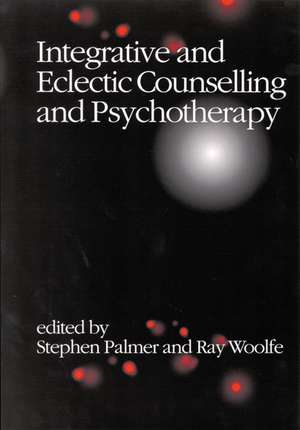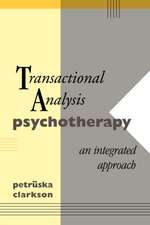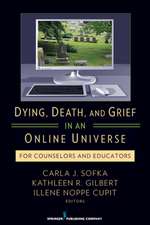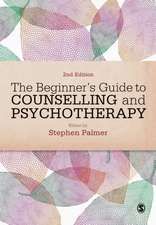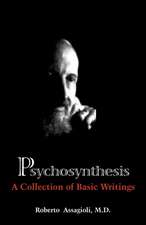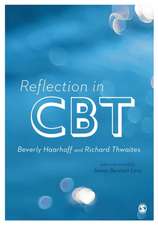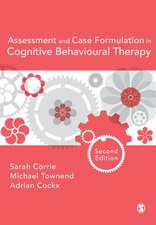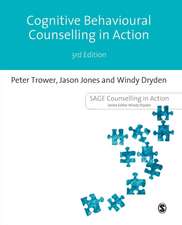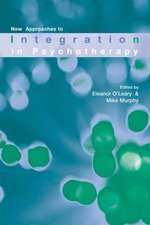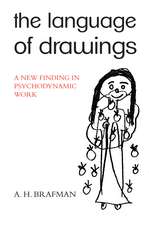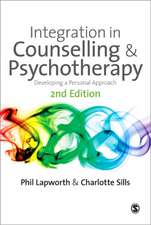Integrative and Eclectic Counselling and Psychotherapy
Editat de Stephen Palmer, Ray Woolfeen Limba Engleză Paperback – 29 dec 1999
`The editors' support for the integrative project is clear, but the book will hold its own with the sceptics too. I recommend it' - Counselling at Work
This innovative and timely book examines the issues and ideas surrounding integration and eclecticism in a therapeutic context, and provides a detailed account of a wide range of approaches in use.
Following an exploration of the origins of integrative and eclectic processes, 10 approaches are explained in detail. Chapters on each approach: describe its central concepts, assumptions and therapeutic goals; outline its view of how psychological disturbance is acquired, perpetuated and resolved; examine how the theory relates to practice - including examples of typical sessions and case studies; and consider which clients might benefit.
Further chapters explore the implications of using integrative and eclectic approaches for training, supervision, for working in a time-limited context and from a multicultural perspective.
Preț: 395.28 lei
Nou
75.63€ • 78.97$ • 62.60£
Carte disponibilă
Livrare economică 14-28 martie
Livrare express 28 februarie-06 martie pentru 42.12 lei
Specificații
ISBN-10: 0761957995
Pagini: 368
Dimensiuni: 156 x 234 x 23 mm
Greutate: 0.61 kg
Ediția:1
Editura: SAGE Publications
Colecția Sage Publications Ltd
Locul publicării:London, United Kingdom
Recenzii
Cuprins
Preface
PART ONE: INTRODUCTION
Eclecticism/Integration - Henry Hollanders
Historical Developments
Eclecticism/Integration - Henry Hollanders
Some Key Issues and Research
PART TWO: THERAPEUTIC APPROACHES
The Conversational Model - Jane Martin and Frank Margison
Integrating Systemic Thinking in Counselling and Psychotherapy - David Bott
A Systematic Integrative Relational Model for Counselling and Psychotherapy - Katherine Murphy and Maria Gilbert
A Relational Approach to Therapy - Stephen Paul and Geoff Pelham
Integrated Eclecticism - Clare Austen
A Therapeutic Synthesis
Multimodal Therapy - Stephen Palmer
Gerard Egan's Skilled Helper Model - Peter Jenkins
Problem Focused Counselling and Psychotherapy - Stephen Palmer and Michael Neenan
Cognitive-Analytical Therapy - David Crossley and Mark Stowell-Smith
Eclecticism and Integration in Humanistic Therapy - William West
PART THREE: ISSUES
Multi-Cultural Issues in Eclectic and Integrative Counselling and Psychotherapy - Colin Lago and Roy Moodley
Integration and Eclecticism in Brief/Time-Focused Therapy - Jenifer Elton Wilson
Integration and Eclecticism in Supervision - Val Wosket
Integration and Eclecticism in Counselling Training - Mary Connor
Eclectic, Integrative and Integrating Psychotherapy or Beyond Schoolism - Petruska Clarkson
Principles and Practice of a Personal Integration - Ian Horton
The Personal, the Professional and the Basis of Integrative Practice - Rhona Fear and Ray Woolfe
Descriere
Stephen Palmer is Joint award winner of the Annual Counselling Psychology Award for outstanding professional and scientific contribution to Counselling Psychology in Britain for 2000. `The editors' support for the integrative project is clear, but the book will hold its own with the sceptics too. I recommend it' - Counselling at Work
This innovative and timely book examines the issues and ideas surrounding integration and eclecticism in a therapeutic context, and provides a detailed account of a wide range of approaches in use.
Following an exploration of the origins of integrative and eclectic processes, 10 approaches are explained in detail. Chapters on each approach: describe its central concepts, assumptions and therapeutic goals; outline its view of how psychological disturbance is acquired, perpetuated and resolved; examine how the theory relates to practice - including examples of typical sessions and case studies; and consider which clients might benefit.
Further chapters explore the implications of using integrative and eclectic approaches for training, supervision, for working in a time-limited context and from a multicultural perspective.
